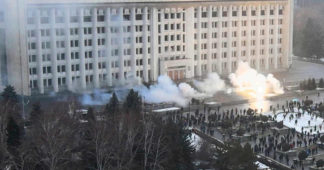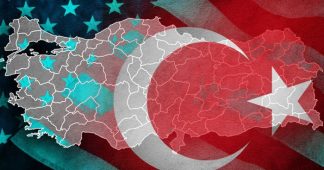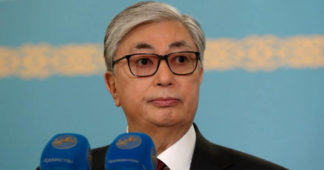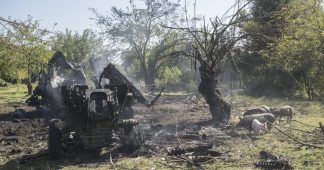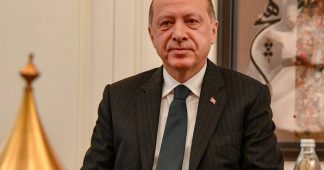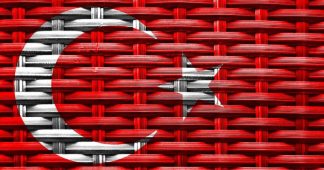Russia shows who has the muscle in Central Asia
By
ISTANBUL — Turkey’s aspirations to lead the greater Turkic world and become a Eurasian heavyweight has met a “reality check,” analysts said, as violence erupted in the ex-Soviet, Turkic nation of Kazakhstan last week.
When the oil, gas and uranium rich country needed security assistance to maintain order, it was the Russia-dominated Collective Security Treaty Organization (CSTO) that it turned to.
Russian President Vladimir Putin claimed victory Monday, after swiftly deploying CSTO forces to guard critical Kazakh infrastructure, allowing Kazakh forces to concentrate on tackling protesters.
“I am confident that our joint efforts will make it possible to fully reestablish control over the situation nationwide and to stabilize it,” Putin told fellow CSTO members in an emergency session.
“We must make sure that events similar to the tragedy happening in the brotherly country of Kazakhstan will not catch us by surprise again and that we are fully mobilized and ready to push back against any new provocation,” he said, hinting to leaders of other ex-Soviet states that the alliance would protect them too.
Geopolitical analyst Michael Tanchum noted that the intervention by Russia and the CSTO in Kazakhstan was “an important cautionary signal” for Turkey and the freshly revamped Organization of Turkic States, “that their ambitions should not outrun their capacity.”
In the wake of the Turkish-assisted victory by Azerbaijan in its war with Armenia in 2020, “a certain ‘Turan’ (greater Turkic world) euphoria took hold on social media,” Tanchum, a senior fellow at the Austrian Institute for European and Security Policy and a non-resident fellow at the Middle East Institute in Washington, said
This gained further momentum last November, when Turkey became the rotating president of the Organization of Turkic States and changed the group’s name from the Cooperation Council of Turkic Speaking States (Turkic Council). The leaders opened a new headquarters in Istanbul and adopted a strategy document titled “Turkic World Vision 2040.”
Ambitious maps of a “Turkic World” emerged on social media after the gathering, with some engulfing western China’s Xinjiang Autonomous Region and parts of eastern Russia.
“Russia confronts a new geopolitical reality of Turkey as a rising Eurasian agenda-setter with its own capacity to reorient connectivity across the Caspian basin and Central Asia,” Tanchum said. “This potential was greatly enhanced by the November 2020 ceasefire agreement that created a corridor through Armenia connecting Azerbaijan to its exclave of Nakhchivan, providing Ankara direct connectivity with Azerbaijan and all of Turkic Central Asia.”
“Russia looks on all of these developments with concern. China does as well,” Tanchum said.
Rich Outzen, a former U.S. military officer and State Department policy-planning official, said, “This has been a great reality check” for Turkey’s ambitions via the Organization of Turkic States. “Just because a great power like the United States is less interested in the region, with the Afghanistan pullout, it doesn’t mean that other great powers like Russia or China are also less interested and there is a free hand to shape anything the way other countries of the region want to.”
“Russians have near-imperial interests in the area and absolutely want to shape it according to their wishes. Chinese as well,” Outzen said.
He said the Organization of Turkic States was about “three years late” in terms of Kazakhstan, and Turkey’s success in assisting fellow Turkic state Azerbaijan in its 2020 war could not be used as a comparison to measure Ankara’s growing influence in the region. Relations with other Turkic countries like Kazakhstan are developing at a comparatively slower pace, Outzen noted
Although not an international security body like the CSTO, the Organization of Turkic States promotes the integration of Turkic-speaking countries in a wide range of areas from culture to connectivity.
Members span from Turkey to Central Asia and include Azerbaijan, Kazakhstan, Uzbekistan and Kyrgyzstan.
Turkmenistan, which embraces a “permanent neutrality” policy, is the newest observer member and joins Hungary on the sidelines of the body. Ukraine has expressed interest in joining as an observer.
On Jan. 6, as violence spread in Kazakhstan, Turkey’s President Recep Tayyip Erdogan held separate calls with leaders of the Central Asian Turkic states, including Kazakhstan President Kassym-Jomart Tokayev. Erdogan told Tokayev that Turkey was closely following the developments taking place in the “friendly and brotherly” Kazakhstan.
To the other Turkic leaders, Erdogan underscored the importance of stability and security in Kazakhstan in terms of its neighbors and the entire region.
On Tuesday, Turkey conveyed a video conference of the foreign ministers of the Organization of Turkic States. A joint statement issued after the meeting drew attention to the Turkic World Vision 2040 document as a “guideline for coordination, cooperation and mutual assistance in addressing domestic and international challenges.”
Speaking to Nikkei Asia, Kazakhstan’s Ambassador to Ankara Abzal Saparbekuly explained that Kazakhstani Foreign Minister Mukhtar Tileuberdi did not put forward any request to the Turkic organization during the video conference, “but gave a detailed explanation of the accounts to member states.”
“That was what the members wanted to hear, firsthand,” Saparbekuly said.
“From here going forward, what kind of cooperation can be done will be decided at the next face-to-face meeting of member states,” he added.
The Turkic World Vision 2040 document refers to building “a network for cooperation and information sharing among member states to combat threats of radicalization, violent extremism, Islamophobia, xenophobia and terrorism, and to ensure border security.”
It also talks of jointly fighting organized crime, illegal drug trade, irregular migration as well as economic, financial and cybercrimes, but no reference is made to joint peace-keeping missions among member states
While Turkish officials have taken a careful and neutral stance on Russia and CSTO involvement in Kazakhstan, Turkish hawks have begun to call for a similar “Greater Turkic army” that can respond to such incidents.
Retired Rear Admiral Cihat Yayci, who served as chief of staff of Turkish Naval Forces until 2020, told local media: “A Turan army should be established.”
Yayci said it is unacceptable that Armenian forces entered Kazakhstan in the name of peace-keeping forces. Such comments will surely be monitored closely in Moscow and Beijing.
Asked about the possibility of a future peace-keeping mission mandate for the organization on Saturday, Turkish Defense Minister Hulusi Akar told reporters: “These are all possibilities and all possibilities are on the table. As developments unfold, any such measures can be taken.”
Akar added that Erdogan’s statement that Turkey is ready to share all kinds of information and experience with Kazakhstan “is an instruction for us.”
“When any request, demand arrives and if we are instructed and ordered as such, we are ready to provide all kinds of help and support to our Kazakhstani brothers,” he said.
Saparbekuly, the Kazakh envoy, said that while the Vision 2040 document does not discuss peace-keeping missions, “After the recent developments in Kazakhstan, every country will evaluate its sovereign decision” on whether to take part in such missions if they were introduced by the Turkic organization, “in line with their respective national interests and international agreements.”
Saparbekuly previously served as deputy secretary general of the organization.
Although Turkey has recently stepped up security cooperation with Kazakhstan through defense industry exports, education and training of Kazakh military personnel in Turkey and joint military drills, its security cooperation is no match for Russia. In Kazakhstan, Russia rents an anti-ballistic missile testing range as well as a spaceport known as Baikonur Cosmodrome.
Saparbekuly confirmed media reports that Kazakhstan has acquired Turkish ANKA armed drones from Turkish Aerospace, saying: “We reached an agreement in principle probably two months ago but still deliveries, financial matters etc. have not been completed.”
On Tuesday, Tokayev appointed Alikhan Smailov as new prime minister and announced that around 2,000 CSTO peace-keeping forces will start to withdraw from Kazakhstan in two days time as the “main mission of the CSTO peacekeeping forces has been successfully completed,” adding the withdrawal process will take “no more than 10 days.”
The Turkish Foreign Ministry, meanwhile, announced Tuesday that Foreign Minister Mevlut Cavusoglu will travel to China on Wednesday.
“It would be appropriate to see in Cavusoglu’s visit an attempt to tamp down concerns, or narratives, that the events in Kazakhstan were a product of pan-Turkist agitation, as some in China have intimated,” Outzen said. Turkey can also explain to Beijing that the Organization of Turkic States does not threaten Chinese interests, he said.
Ogul Tuna, a researcher of post-Soviet studies at University of California, Irvine said that Cavusoglu’s upcoming visit to China can be an effort to balance Russia’s move as well as to reassure the Chinese that Ankara does not have a Pan-Turkist agenda
Published at asia.nikkei.com
We remind our readers that publication of articles on our site does not mean that we agree with what is written. Our policy is to publish anything which we consider of interest, so as to assist our readers in forming their opinions. Sometimes we even publish articles with which we totally disagree, since we believe it is important for our readers to be informed on as wide a spectrum of views as possible.
